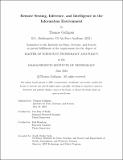| dc.contributor.advisor | O'Reilly, Una-May | |
| dc.contributor.advisor | Hemberg, Erik | |
| dc.contributor.author | Galligani, Thomas | |
| dc.date.accessioned | 2023-08-23T16:17:58Z | |
| dc.date.available | 2023-08-23T16:17:58Z | |
| dc.date.issued | 2023-06 | |
| dc.date.submitted | 2023-07-17T15:19:19.488Z | |
| dc.identifier.uri | https://hdl.handle.net/1721.1/151905 | |
| dc.description.abstract | This thesis considers the ways researchers and decision-makers deal with malicious actions in the information environment (IE). We are motivated by the profusion of research since 2016 aiming to understand, predict, and respond to various phenomena like mis- and disinformation within online social interactions. We begin by outlining three layers of complexity within this IE that make it exceedingly difficult to understand (strategic interaction, technological mediation, and cognitive obfuscation) and describe the framework of logical inference (induction, deduction, and abduction) that we use to assess research methodologies. We find that post-2016 literature focused on malicious actions in the IE has underappreciated insights from post-World War II propaganda analysis literature. We argue that researchers must separate modes of inference in their research, distinguishing between inductively testing a tool and abductively analyzing particular environmental conditions in order to provide results which are reusable and valuable to a decision-maker. This motivates our proposed methodological framework. Intelligence, Reconnaissance, and surveillance (ISR) -- a systematic way that the US military leverages research in remote sensing to understand complex physical environments -- provides a logical framework to ground this inferential distinction in research in the IE. Finally, we apply this methodology, developing a sensor which captures the influence operation tactic of reputation laundering, testing the sensor on a novel dataset of assassination-related Tweets, and find significant evidence (p<0.0001) that our sensor's observations can capture this reputation laundering and integrate it into an analyst's workflow. | |
| dc.publisher | Massachusetts Institute of Technology | |
| dc.rights | In Copyright - Educational Use Permitted | |
| dc.rights | Copyright retained by author(s) | |
| dc.rights.uri | https://rightsstatements.org/page/InC-EDU/1.0/ | |
| dc.title | Remote Sensing, Inference, and Intelligence in the Information Environment | |
| dc.type | Thesis | |
| dc.description.degree | S.M. | |
| dc.contributor.department | Massachusetts Institute of Technology. Institute for Data, Systems, and Society | |
| dc.identifier.orcid | https://orcid.org/0000-0001-6306-4384 | |
| mit.thesis.degree | Master | |
| thesis.degree.name | Master of Science in Technology and Policy | |
